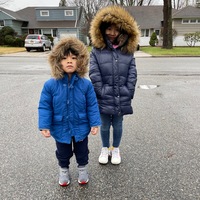✏️Graduated with Bachelor Degree in Early Childhood Education
✏️Working with children more than 9 years.-with 2.5 years old kids👶🏻to 10 years old kids👦🏻
✏️Teacher Training Program in Chinese as a Foreign Language in 2016.✨✨✨
✏️With Kindergarten Teacher certification in Taiwan.
✏️Bilingual Teacher 2015-2017
✏️Montessori Teacher in China.2017-2019
✏️Thematic Teacher in Taiwan. 2019-2021
✏️Waldorf Teacher Training 2020
📣採約課制📣
📣Please contact teacher first before buying the class, thank you !📣
*Customized class, Traditional繁體🆗/Simplified简体🆗/Zhuyin🆗/Pinyin🆗
✨Fun & Systematic Courses✨
📣 Learning Through Stories 📣
🦓Stories Course🦓
🕑 25-minutes / 50-minutes
👶🏻 Age: 2.5-6
-Customized themes
-Interesting activities:
1️⃣ 繪本問答📖stories,
2️⃣ 兒童歌曲🎵songs,
3️⃣ 律動舞蹈💃🏻dancing,
4️⃣ 美勞創作✂️drawing,
5️⃣ 字卡遊戲💻flash card games,
6️⃣ 扮演遊戲⚽️imaginative play, etc.
-Teacher's self-made teaching materials
🦓 Basic Course 🦓
🕑 50-minutes
👱🏽♂️👩🏽🦰Age: 7-15 (Pinyin🆗/Zhuyin🆗)
-Self-introduction, Daily conversation💁🏻♀️, Chinese Grammar Wiki📓
-Teacher's self-made teaching materials✍🏻
-Popular textbooks for overseas schools
-Interesting theme video🎬
✨Learning through play✨ is a term used in education and psychology to describe how a child can learn to make sense of the world around them. Through play children can develop social and cognitive skills, mature emotionally, and gain the self-confidence required to engage in new experiences and environments.
🌟A good story 🌟 encourages us to turn the next page and read more. We want to find out what happens next and what the main characters do and what they say to each other. We may feel excited, sad, afraid, angry or really happy. This is because the experience of reading or listening to a story is much more likely to make us 'feel' that we are part of the story, too. Just like in our 'real' lives, we might love or hate different characters in the story. Perhaps we recognise ourselves or others in some of them. Perhaps we have similar problems.
Because of this natural empathy with the characters, our brains process the reading of stories differently from the way we read factual information. Our brains don't always recognise the difference between an imagined situation and a real one so the characters become 'alive' to us. What they say and do is therefore more meaningful. This is why the words and structures that relate a story's events, descriptions and conversations are processed in this deeper way.
In fact, cultures all around the world have always used storytelling to pass knowledge from one generation to another. Our ancestors understood very well that this was the best way to make sure our histories and information about how to relate to others and to our world was not only understood, but remembered too. (Notice that the word ‘history’ contains the word ‘story’ – More accurately, the word ‘story’ derives from ‘history’.)
Encouraging your child to read or listen to stories should therefore help them to learn a second language in a way that is not only fun, but memorable.
https://www.cambridgeenglish.org/learning-english/parents-and-children/your-childs-interests/008-learning-english-through-stories/





